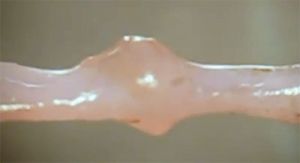A novel idea from GW School of Medicine and Health Sciences (SMHS) researcher Narine Sarvazyan, Ph.D., could send relief to countless patients around the world suffering from chronic venous insufficiency — a disease in which patients experience sluggish venous blood flow from the legs back to the heart.

Sarvazyan, a professor of pharmacology and physiology at SMHS, has invented a new organ to help return blood flow from veins lacking functional valves. A rhythmically contracting cuff made of cardiac muscle cells surrounds the vein, acting as a “mini heart” to aid blood flow through venous segments. The cuff can be made of a patient’s own adult stem cells, eliminating the chance of implant rejection.
“We are suggesting, for the first time, to use stem cells to create, rather than just repair damaged organs,” says Sarvazyan. “We can make a new heart outside of one’s own heart, and by placing it in the lower extremities, significantly improve venous blood flow.”
This potential new treatment option, outlined in a paper titled “Thinking Outside the Heart: Use of Engineered Cardiac Tissue for the Treatment of Chronic Deep Venous Insufficiency,” published in the Journal of Cardiovascular Pharmacology and Therapeutics, represents a leap for the tissue engineering field, advancing from organ repair to organ creation. To date Sarvazyan, together with members of her team, has demonstrated the feasibility of this novel approach in vitro and is currently working toward testing these devices in vivo.



